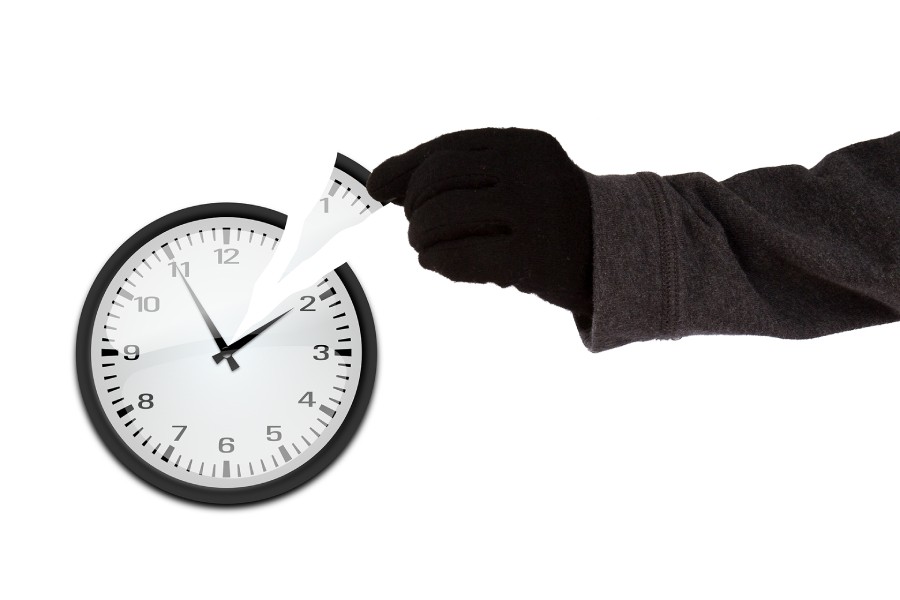Introduction
Over the years, you must have come across the term ‘time theft’. Organizations didn’t know this existed until it started to impact their business. According to the American Payroll Association “ Over 75% of firms suffered monetary losses from buddy punching.
But, what exactly is time theft? In the definition, time theft is the deed of the employees of a firm using unauthorized company time without using any type of allotted leaves, whether intentionally or unintentionally. Such an act is often an act of violation of company policies and sometimes even laws.
In other words, employees marking their attendance even when they are not present in the office either via buddy punching or any other such methods. Employees are usually liable for these actions with the ripple effect possibly leading to labor law violation or drop in company goodwill.
According to the American payroll Association, this is how time theft and buddy punching are impacting businesses.
- 4.5 hours per week,i.e., the equivalent of 42 days of holidays are stolen by employee in work time
- Over 75% of firms suffer monetary loses from buddy punching
- A whopping 2.2% of gross payroll are from buddy punching accounts.
Different ways an employee can steal time.
To resolve and prevent the problem of time theft, managers and small business owners need to understand the root causes with the goal of developing or upgrading a time theft policy and punishment criteria.
Smaller time thefts can be, and usually are unintentional. For instance, in a situation where an inside sales executive forgets to log out of her or his device before closing for the day.
However, intentional theft often leads to hikes in labor expenses. An example of the same is a field executive not working but leaves their device- laptop, tablet or phone, in a logged in state.
Here are few recurring types of time theft in field and workplace:
- Inaccurately entering timestamp data: Many businesses with legacy systems leave it to the workers or employees to manually fill timesheets. This usually results in more timesheet related frauds and errors such as rounding up instead of entering accurate hours and minutes worked.
- Buddy punching: Buddy punching is an example of intentional theft wherein one employee clocks in or out for another employee as their unofficial proxy. This is usually done when employees share their system credentials or login details to log in early or log out later than actual work hours.
- Utilizing work hours for personal work: Spending hours filing tax returns, making investments or simply wasting time watching videos or social media are common reasons for time theft.
Punishing employees for time theft by not paying wages without evidence of the violation can lead to legal action from authorities such as the United States Fair Labor Standards Act (FLSA).
According to a Forbes article, 89% of employees admitted to work wasting time at work intentionally and unintentionally.

‘Time is money’, so how to prevent time theft at work?
Once you’ve identified the methods and reasons for time theft, the next step is the business end of the problem: how to solve it.
- Develop a workplace culture that rewards and encourages high morale and respect for work
Endearment or sense of responsibility from an employee towards their workplace stems from a culture that supports and encourages honest work and performance. This leads to creation of a relationship and open channel of communication b/w employees and the management.
This leads to reduction and elimination of reasons leading to time theft but also respecting rules and regulations against time theft.
- High quality workplace policy and work agreements
An employee that knows the rewards and punishments invoked or received from violating or abiding to a clearly stated workplace policy is much less likely to commit theft by entering inaccurate time clocks or time tracking details. A work policy that clearly defines ‘red flags’ and best practices are a preventive way of ensuring resolution of the time theft issue.
And finally,
- Technology! – A GPS based time clock and tracking app
It’s almost 2023 and the use of legacy based systems such as pen-and-paper time sheets or MS Excel is already too old to counter modern problems and methods of theft.
While policies and culture are essentials to preventing time theft in the long run and eventually eliminating it in the future, it does little to resolve the present problem with any great effect.
Hence, a time clock with GPS & geofencing feature is the near ideal solution to counter time theft as it enables you to eliminate or lower misreported work hours by setting pre-determined ‘if-this-then-what’ rules in the system.
An optimal time tracking app with GPS lets the managers or owners set up alerts, reminders, automated logins and logouts for start.

How to select the right GPS time clock system?
Before deciding on a GPS time clock, the manager or owner must assess the quality and availability of certain features to make the correct purchase decision.
Here are the following:
- Automated Unique User Recognition: The identity of the user logging in, logging out or going on a break must be unique and safeguarded against proxy punching. Unique users must be identified thereby leading to real-time data transfer for the overall attendance & work hour database as well as reports. This ensures that manual intentional errors are not possible and unintentional errors are eradicated by the way of automated rules that deny entry/exit upon wrong user entry into the time clock.
- GPS Data
Using only timestamp data from time tracking systems or time clocks might lead to errors going unnoticed and hence not rectified, if and when they occur. GPS data acts as a safeguard against the same by ensuring whether the employee was on the location when they clocked in or out.
This is especially helpful for off site employees where different job sites and locations are involved. By sharing GPS locations, employee verification can be practiced without having to hamper or interrupt the employee’s work with repeat manual checks or reminders.
- Alerts and Notifications
Despite time clock and tracking software preventing incorrect data entry or wrong timestamp entry, some employees are still privy to the “forgot to clock-in/out” reason while being in violation by either entirely skipping check-ins or attempting to buddy punch.
.
A direct countermeasure to this scenario is a holistic time tracking and clocking app that comes with in-built and customizable text and/or even call alerts reminding employees to clock-in when they are at their job site. This is especially beneficial in case of construction businesses and field workers.
An optimal GPS time clock and tracking solution can help the business & its owner can reap the following benefits:
1. Timesheets available in real-time
With a cloud based time tracking system, the time clock data collected from the field is available on the cloud and can be looked at by authorized personnel to observe and manage their mobile and on field employees efficiently.
2. Geofencing leading to greater control
A time clock software must come with a geofencing feature. With this feature, both employees and managers can be at ease. As employees will be either clocked in or clocked out automatically when they enter/leave the jobsite or they will be reminded via notifications.
Not only, this mitigates the possibility of buddy punching but also, solves the missed-punch or early/late punches issues.
Discrepancies such as an employee clocking out virtually from their home can be identified and corrective action taken.
3. Location & path tracking
A time clock with GPS enables managers to not only see clock in and clock out locations with timestamps, but also can help keep checks on both safety and time theft. This can be done with breadcrumb reports which enable managers to see the presence and paths the employees took. This boosts accountability and helps payroll calculations.

Conclusion
In the end, time theft is one of the issues that is prevalent across industries. Not only do businesses face monetary losses but their company image is impacted as well.
With the right time management system in place, you can manage employees’ time more efficiently with reduced possibility of buddy punching. Moreover, if you replace the traditional manual process with an automated time clock app, it will make your entire workflow seamless, from time and attendance to accurate payroll calculation.
The smart alternative is to utilize a GPS time clock app to keep track of all information automatically. Attain easy access to the information in real time while keeping checks on intentional and unintentional time theft by using geofencing, reports and custom alerts on employee devices.


